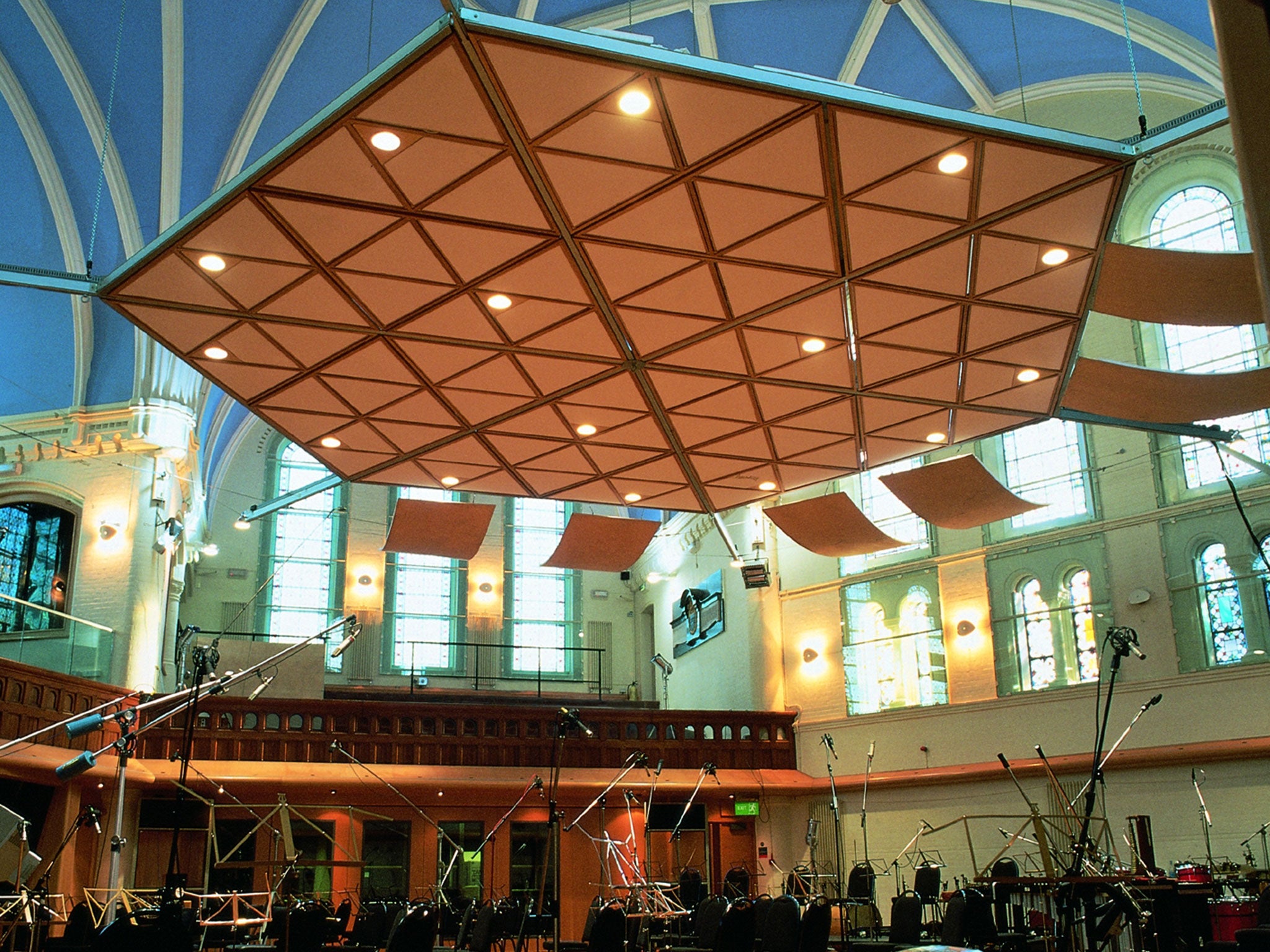Band Aid studio’s bitter tears over neighbours’ basement plans
Musicians at the studio, founded by Beatles producer George Martin, have written to Camden council asking planners to refuse permission

The last thing you need when you have a full orchestra trying to lay down the latest Bond theme tune is the sound of builders hammering and drilling next door.
But that is the prospect that has infuriated the James Bond film score composer David Arnold who fears the legendary AIR recording studios in Hampstead, north London, will be made unusable by work ordered by neighbours who hope to dig out a super basement and install a new swimming pool.
Musicians at the world-famous studio, founded by Beatles producer George Martin, have written to Camden council asking planners to refuse permission for the refurbishment and excavation work at a grade II-listed home in Rosslyn Hill.
Homeowners Andrew and Elizabeth Jeffreys have outlined plans to create a new dining room extension and dig out a basement for a pool, gym and television room. Builders will excavate a smaller but deeper sub-basement to accommodate a plant room at the property, which dates from 1770.
But the request for planning consent filed at the town hall has triggered a slew of complaints from neighbours who say the work is too expansive and disruptive. These include musicians at AIR studios, which moved into the building next to the Jeffreys’ home – previously known as Lyndhurst Hall – in 1992 after moving out of its previous base near Oxford Street.
It is a magnet for some of the world’s best-known composers and musicians, and was where the 2004 Live Aid single – featuring Sir Bob Geldof, Chris Martin and Bono – was recorded.
Arnold, who has written and recorded the music for five Bond films and was music director for the closing ceremonies at the London Olympics, says in his letter to planners: “When I record in the main hall at AIR with an orchestra every extraneous noise can affect the work. If there is a noise beyond a certain level we can’t work.”
He adds: “The studio is home to many film composers who work here and bring in millions of pounds worth of business from abroad. It’s effectively a hugely successful export business.
“That income goes to musicians, hotels, catering, transport, music printing and copying, to name but a few. The type of excavation works proposed and the drilling involved would render our workplace unusable. It couldn’t function as a recording studio and would send those millions of dollars to other countries, Prague, Berlin etc and possibly even with other composers.”
Enjoy unlimited access to 100 million ad-free songs and podcasts with Amazon Music
Sign up now for a 30-day free trial. Terms apply.
ADVERTISEMENT. If you sign up to this service we will earn commission. This revenue helps to fund journalism across The Independent.
Enjoy unlimited access to 100 million ad-free songs and podcasts with Amazon Music
Sign up now for a 30-day free trial. Terms apply.
ADVERTISEMENT. If you sign up to this service we will earn commission. This revenue helps to fund journalism across The Independent.
AIR studios chief executive Paul Woolf adds in his objection: “There is a well-known risk in basement digging… The premises we occupy are grade II-listed and are of heritage value and nothing should be allowed that may have any risk attached to it.”
The studios’ legacy dates from 1965 when Martin set it up in the West End with partner John Burgess. A second studio was created in Montserrat in the West Indies, but it was wrecked by Hurricane Hugo in 1989.
Toby Pitman, a resident musician at the present-day studios, said of the proposed work: “It would basically make my work environment unusable for the duration of the works, causing huge financial loss.
“It would also severely affect the livelihood of hundreds of musicians, engineers, staff and other residents who use the establishment on a daily basis.”
The studio users are not the only objectors. The Heath and Hampstead Society has warned that the house at the centre of the refurbishment needs protection, because of its exemplar status as a grade II-listed house “relatively untouched by the vulgar excesses of the 21st century”.
The group has already warned of the number of listed and historic homes in the area that are being put at risk because of the fashion for super basements.
The society adds: “The basement, whose construction would devastate the site, is far too big … If we must accept the so-called modernisation of this beautiful listed house by the addition of swimming pool, gymnasium and cinema, then it must be done more sensitively than this.”
Architects working for the Jeffreys, however, insist that the plans are sensitive – and that the work will “not result in any harm to the amenity of neighbouring occupiers”.
They argue that the proposed work has been carefully drawn up with respect to the property’s heritage as a “rare survivor of an earlier Hampstead”.
The application, currently on the desks of council planners while a consultation survey continues, says: “After long periods of neglect and dereliction the house is once again occupied by a young family that would like to enjoy both the house and garden to their fullest.”
Join our commenting forum
Join thought-provoking conversations, follow other Independent readers and see their replies
Comments